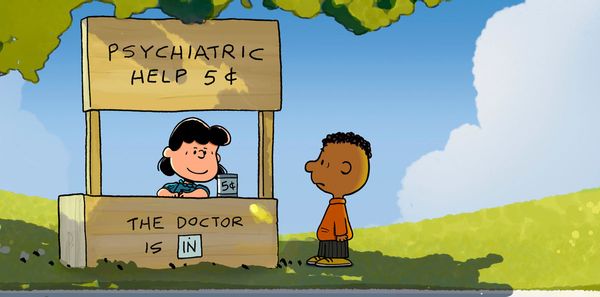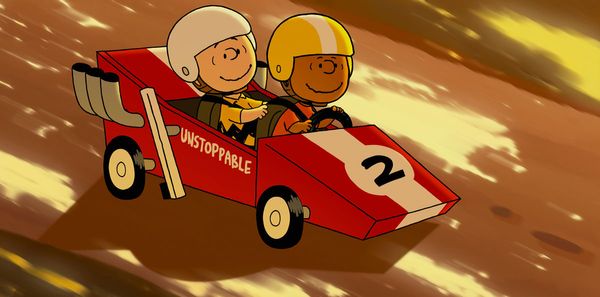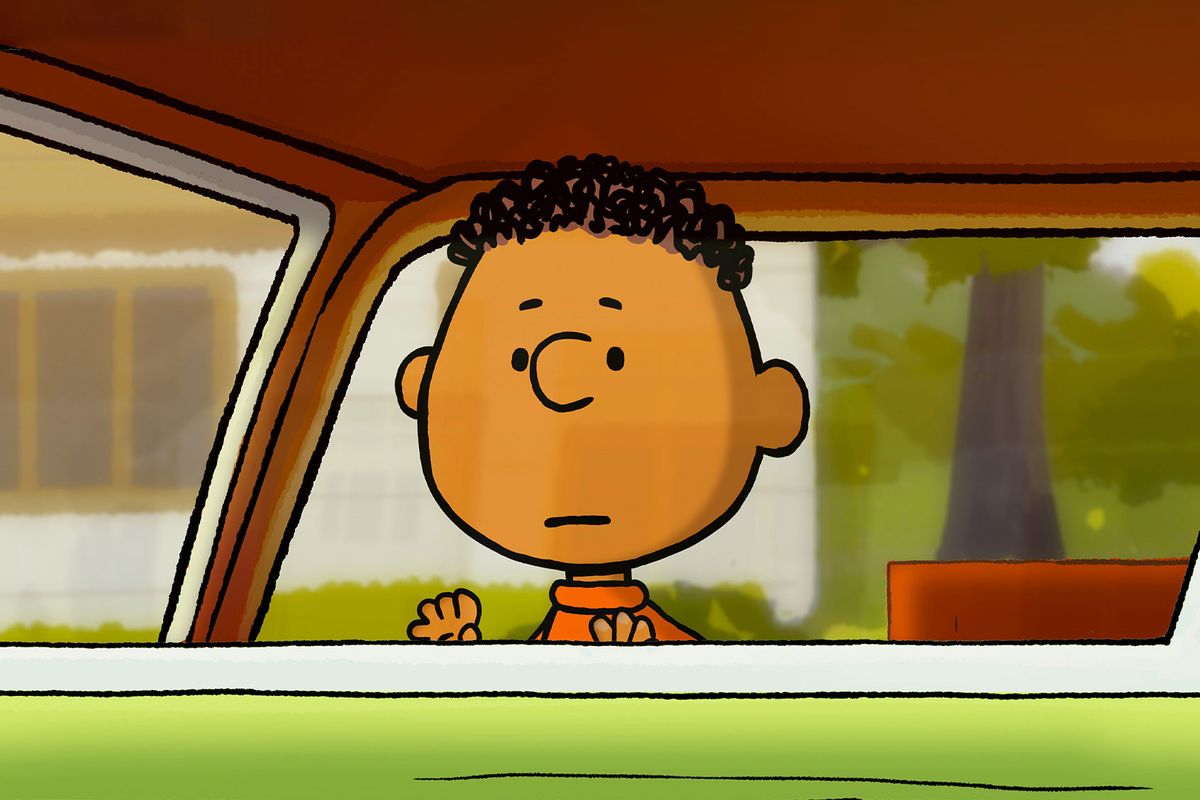It took “Peanuts” creator Charles M. Schulz 26 years to give Franklin, the Black kid, a last name. This wasn’t intentional but, rather, something Schulz forgot to do until 1994. He was working on a scene in the NBC special “You're in the Super Bowl, Charlie Brown" where the announcer calls out the character names that by then were considered part of Americana: Charlie Brown! Linus Van Pelt! When it was Franklin's turn to take the field, Schulz realized his embarrassing oversight.
Thirty years later Franklin stars in Apple TV+'s “Snoopy Presents: Welcome Home, Franklin,” the first meaningful character expansion in his existence and another very late arrival – 24 years and four days after Schulz died in 2000, and nearly 56 years after the character's 1968 introduction.
But to fans of a certain age, its tardiness may not be surprising. Much of what we know about Franklin wasn’t learned from any of those TV specials, the first and most beloved of which pre-dates his introduction by three years. Instead, if you noticed Franklin at all, that may be courtesy of a rant Chris Rock delivered on a 1992 episode of “Saturday Night Live,” during its "Weekend Update" segment.
Rock starts with a scenario familiar to a lot of people who aren’t white. “I was the only Black kid in my grade,” he said. “I felt like Franklin from 'The Charlie Brown Show' [sic].”
A few lines later his riff took off by nailing an uncomfortable truth about Franklin. “Everyone on Charlie Brown is their own character that's all thought out, you know. Linus got the blanket, Lucy's a b***h, Schroeder plays the piano, Peppermint Patty's a lesbian. Everybody got their thing – except Franklin! Come on, give him a Jamaican accent or something!”
We all knew what Rock was talking about. Franklin, for the most part, was just there. Evidence that the Peanuts’ world was integrated. He didn’t have many memorable interactions with dear old Chuck worth noting and, contrary to what Rock alleged, had a few lines here and there. But nothing he said was particularly meaningful or memorable. Schulz explains why that is in a 1988 interview with animation historian Michael Barrier.
“I've never done much with Franklin, because I don't do race things,” Schulz said. “I'm not an expert on race, I don't know what it's like to grow up as a little Black boy, and I don't think you should draw things unless you really understand them, unless you're just out to stir things up or to try to teach people different things. I'm not in this business to instruct; I'm just in it to be funny. . . . Let somebody else do it who's an expert on that, not me.”
Ouch.
Schulz was not alive to witness the last decade’s rolling back of civil rights laws and the movement for Black lives. Indeed, his view is reflective of the paradigm held by many white moderates of the Silent Generation, which held that taking a step is enough and that it’s better to let your effort stand than make more trouble.
 Lucy Van Pelt and Franklin Armstrong in "Snoopy Presents: Welcome Home, Franklin" (Apple TV+)
Lucy Van Pelt and Franklin Armstrong in "Snoopy Presents: Welcome Home, Franklin" (Apple TV+)
Franklin, for the most part, was just there. Evidence that the Peanuts’ world was integrated.
But we shouldn't judge Schulz too harshly. Take into account what he did a few years later.
We would never have known that Schulz forgot to fully name Franklin’s if he hadn’t confessed to “JumpStart” animator Robb Armstrong during a phone call that he’d done Franklin a great disservice, as Armstrong recalled in a 2022 Newsweek interview. Schulz wasn’t phoning one of the few well-known Black animators in the business to ask for absolution. He wanted permission to give Armstrong’s surname to Franklin.
“Welcome Home, Franklin” doesn’t merely fill in the long-standing blank space in the character’s bio, but affords Armstrong, who co-wrote the special, to pay tribute to Schulz’s quietly revolutionary integration of comic strips while lending the character that experiential expertise Schulz was convinced that he lacked.
Rock wasn’t entirely correct when he joked that Franklin didn’t have a line for 25 years. The character said several in his first appearance on July 31, 1968, when he returned Charlie Brown’s lost ball while both were playing at the beach. From there, Charlie Brown invited Franklin to check out his sandcastle which, like the saddest Christmas tree in the canon of holiday special, is the Charlie Browniest.
“It looks kind of crooked,” Franklin tells his new friend.
“I guess maybe it is,” Charlie Brown replies. “Where I come from, I’m not famous for doing things right.”
We need your help to stay independent
The special recreates this meet-cute while updating Franklin’s single defining trait other than his Blackness: Franklin's father is away fighting in the Vietnam War. “Welcome Home, Franklin” retains part of that identity, explaining he’s in a military family and moves around a lot, making it difficult to sustain new friendships.
The story doesn’t overtly attribute Franklin’s loneliness to the fact that he’s the only Black kid in his friend group – one of those “race things” Schulz backed away from – although, at the start, it does call out the obvious thing any person of color notices when they enter an unfamiliar space.
“One thing was for sure: there was a lack of variety in this place, ” Franklin says in an uncertain-sounding voiceover as he sees Charlie Brown, Sally, Peppermint Patty and Marcie for the first time.
Schulz soon discovered the character didn’t have to say anything to rile up racists. His presence was enough.
Charlie Brown, who made his debut with the Peanuts comic strip in 1950, is viewed as an extension of Schulz. His creator, a man known for his humility, softly refuted that over the years. But those searching for evidence backing pop culture's prevailing opinion may find none more solid than Franklin’s history and the circumstances that brought him into being.
Franklin wouldn’t exist if not for a Los Angeles schoolteacher named Harriet Glickman, who wrote Schulz 11 days after Martin Luther King, Jr.’s assassination in April 1968. In her letter to Schulz (a segment of which NPR published in 2015), she suggested that he introduce a Black character to the Peanuts gang to promote and perhaps normalize interracial friendship.
Schulz wrote back, admitting his openness to the idea along with his hesitance that if did so, it might seem condescending to Black families. He was afraid he wouldn’t do it right.
At this, Glickman enlisted two of her friends, both Black, to suggest ways for Franklin to seem like a typical Black kid whom Charlie Brown would befriend. A little while later Franklin made his debut in a three-strip series that ends with the boys making plans to play together.
 Charlie Brown and Franklin Armstrong in "Snoopy Presents: Welcome Home, Franklin" (Apple TV+)Franklin’s move into the Peanuts neighborhood didn’t go unnoticed, as Schulz soon discovered the character didn’t have to say anything to rile up racists. His presence was enough. Schulz recalled in several interviews that a Southern newspaper editor told him “I don’t mind you having a Black character, but please don’t show them in school together.”
Charlie Brown and Franklin Armstrong in "Snoopy Presents: Welcome Home, Franklin" (Apple TV+)Franklin’s move into the Peanuts neighborhood didn’t go unnoticed, as Schulz soon discovered the character didn’t have to say anything to rile up racists. His presence was enough. Schulz recalled in several interviews that a Southern newspaper editor told him “I don’t mind you having a Black character, but please don’t show them in school together.”
He did, in a strip depicting Peppermint Patty bragging about her book report to Franklin, who simply sits in silence, looking bemused.
Want a daily wrap-up of all the news and commentary Salon has to offer? Subscribe to our morning newsletter, Crash Course.
In his 2024 special Franklin says plenty of things that help us finally know him. He loves baseball. His favorite musicians are James Brown, Stevie Wonder and John Coltrane, reminding us that the Peanuts are both timeless and eternally culturally fixed in 1960s and 1970s America.
He’s also determined to make friends wherever he goes by getting to know people, and requiring that we get to know him in return. “I’m honored to call you my friend,” Charlie Brown tells Franklin in a scene that establishes at long last who Franklin is at his core, welcoming him home after decades of him sitting quietly on the Peanuts’ periphery.
“Snoopy Presents: Welcome Home, Franklin" debuts Friday, Feb. 16 on Apple TV+.



Shares